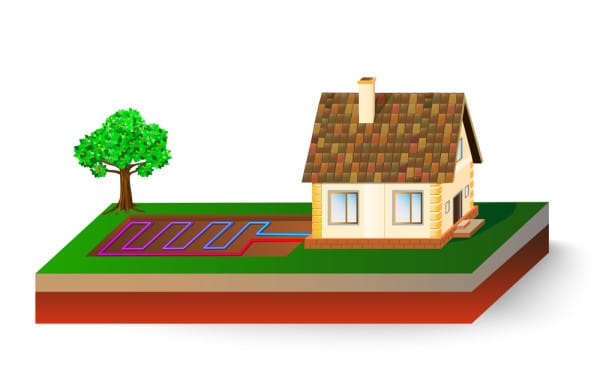By harnessing the energy buried in the earth, a geothermal heat pump can heat or cool your Eight Mile, Alabama, home efficiently and reliably for decades. Learn how a geothermal heat pump works and how it can conserve energy resources, keep your home comfortable in both summer and winter, and save you money.
How a Geothermal Heat Pump Works
Using energy stored in the earth, a geothermal heat pump can both heat and cool your home. It works like a traditional air source heat pump in that it transfers heat into or out of your house to keep it at a comfortable temperature. However, unlike an air source heat pump, a geothermal heat pump isn’t exposed to the outside air — its heat transfer takes place under the ground.
A geothermal heat pump is made of an indoor heat unit and the outdoor underground component. For the outdoor part of the system, loops of plastic pipe are buried several feet under the ground. A blend of antifreeze and water circulates through the plastic pipe, transferring heat between your home and the ground outside.
When heating your home, the heat pump absorbs heat from the ground and transfers it to your home. When the unit cools your home, the heat transfer happens in the opposite direction and heat moves from your home to the outdoor component into the ground.
Efficiency
Geothermal heat pumps are some of the most efficient heating and cooling units on the market today. The reason for this high efficiency is because a geothermal heat pump utilizes heat below ground where the temperature is more stable than the outside air.
A few feet below the earth’s surface, temperatures stay around 50 degrees Fahrenheit year-round no matter how warm or cool the temperature on the surface. Transferring heat at this temperature requires much less energy than that used by other systems.
Unlike a fuel-burning system, there is no combustion in a geothermal heat pump — which means no waste. When heat is produced using fuel, there is always some heat and gas that goes to waste. A geothermal heat pump is powered by electricity and does not produce emissions, allowing it to reach higher efficiencies than fuel-burning heating systems.
Reliability
Because the outdoor component is not exposed to the weather like an air conditioner and doesn’t produce heat using combustion like a furnace, a geothermal heating system is a lot more durable. You can be confident that your family will stay comfortable during the hottest days of summer and the coolest days of winter.
A geothermal system typically has a longer life span than a traditional heating or cooling system because it has fewer moving parts and because it is protected from the elements. Maintenance for a geothermal heating system is also minimal when compared with traditional HVAC units.
Cost
The durability of a geothermal heat pump coupled with its energy efficiency translates into ongoing cost savings for homeowners. A geothermal heat pump uses less electricity than an air source heat pump, costing less to heat and cool your home than a typical air conditioner or furnace.
Despite the efficiency advantages of geothermal energy, the upfront cost of installing a geothermal heat pump is expensive. The unit requires the installation of a series of pipes underground, which makes these systems some of the most complicated to install. It’s important to make sure you have a qualified HVAC contractor install any geothermal system to ensure it will heat and cool your home properly.
After it is installed, the continual costs savings from the high efficiency of a geothermal unit can add up quickly. Energy savings from your geothermal heat pump could pay for the unit in as little as four years.
At Air Specialty, our technicians are proud to install and service geothermal heat pumps in the Eight Mile, Alabama, area. Thinking about putting efficient, reliable geothermal energy to work in your home? Call (251) 415-4559 to speak with one of our experts about your geothermal heat pump options today.
Image provided by Shutterstock

